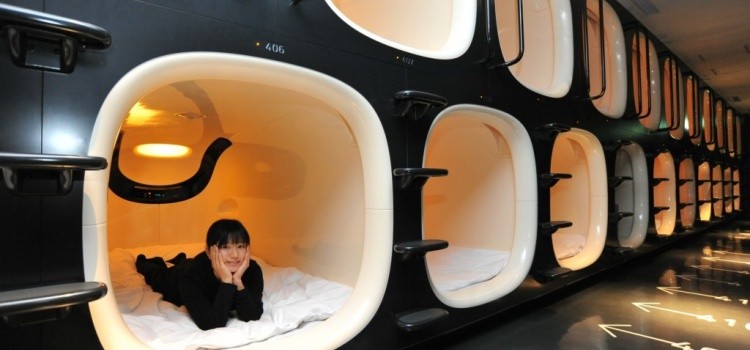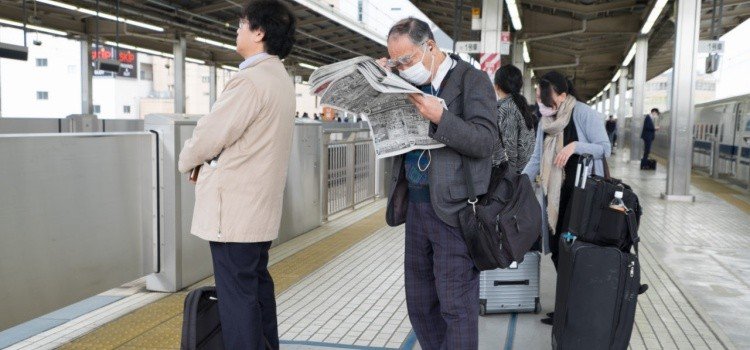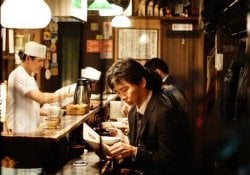Many believe that the high suicide rate, working hours and other stereotypes of Japanese culture results in a depressed nation. I myself have come across several people saying that the Japanese are sad. is this really true? In this article, we will understand a little about the subject and see some of the things responsible for the unhappiness of the Japanese.
Imagine having to work 10 hours a day, spend hours on a train, eat lunchboxes or instant noodles every day? This is not uncommon in Japan, particularly in large cities. Getting a job promotion or a pay raise is unlikely. Nothing different from life in São Paulo.
Fun? Many spend train trips playing on their cell phones or watching videos, others go to karaoke every week alone. Social interaction is low even through cell phone messages. When he is at home he spends most of his time sleeping or on the internet. How to be happy with this lifestyle?

This is ironic, as Japan offers so many options for food, leisure, tourism and things that can fill the void. Yet people choose a lifestyle focused on work and money. It is a common way of life, but we cannot fully take it into account within a space with 127 million inhabitants.
Índice de Conteúdo
What are the causes of unhappiness in Japan?
Having a demanding and repetitive routine really causes unhappiness, resulting in a disease that is taking over the entire world, the famous depression. Many Japanese have trouble socializing, whether it's shyness or independence, they don't open up or express their feelings to strangers.
Being reserved is something normal and people like that are plentiful in all countries, the big difference is that the Japanese don't have any habit of visiting psychologists or psychiatrists. Having someone to listen to your problems is always good, and unfortunately some Japanese people don't have that someone.

Social stigmas play a very strong role in all parts of Japanese life. The cultural pressure not to make mistakes ends up bringing unhappiness. Some even commit suicide because of it. These cultural and structural factors are likely to influence people who are already overworked and stressed to feel even worse.
At school the Japanese are encouraged to always do their best, to be number one! Otherwise it will be a failure. 12-year-olds already suffer from anxiety disorders because they're afraid they won't score well on their exams. Unfortunately, Japanese people are obsessed with status and material possessions, and we know that doesn't bring true happiness.
Understanding the Happiness Ranking
According to happiness ranking, Japan is in the 51st position. Brazil, in spite of all the crisis and insecurity, is in 21st place. Despite these positions, there are many things that were not clarified in this ranking.
If we look at the ranking below, we will notice that Japan only loses badly in Dystopia. Dystopia is a hypothetical country representing the smallest national measures for each key variable, with residual errors. This country has lower averages for each variable, serving as a regression base (I'm still confused by this xD).
Responsive Table: Scroll the table sideways with your finger >>
| post | Country | Pts | GDP | Signed Social | Expect of life | Freedom | Generosity | Confidence | dystopia |
| 1 | Norway | 7 | 1.616 | 1.534 | 0.797 | 0.635 | 0.362 | 0.316 | 2.277 |
| 22 | Brazil | 6 | 1.107 | 1.431 | 0.617 | 0.437 | 0.162 | 0.111 | 2.769 |
| 51 | Japan | 5 | 1.417 | 1.436 | 0.913 | 0.506 | 0.121 | 0.164 | 1.363 |
The criteria covered in this statistic show that Japan wins in many ways. A stat doesn't mean anything unless it's put into context. For example, Japan ranks 26th in the world's suicide rankings. The numbers have dropped a lot and currently South Korea which has a high rate of suicides in 10th place.
Factors that cause suicides include unemployment, economic problems and social pressures. I personally don't think Japan's suicide rate is as high as people think. You see, there are 15 people per 100,000 inhabitants, in Brazil there are 13 and in the USA there are 12, a small difference. Even so, Japan is always cited as an example of suicides, probably because of its small size that makes things happen in a concentrated way.
Are the Japanese happy?
In fact, what is happiness? Happiness is something that needs to be achieved individually. As much as the Japanese have social problems, they seek happiness in their own way, whether through some hobby, sport, game or something individual. In Japan there are thousands of things to do to get rid of boredom. Even though there are always people working, there are others who are always traveling and having fun.

The stereotype that the Japanese are more depressed than people from other countries is wrong and outdated. As much as there are those who try too hard for nothing and still find a void in their life. Many other Japanese people know what they really want, and it is thanks to their efforts to work hard, follow rules and be a perfectionist by nature, that Japan has become such a comfortable place to live and travel.
If we stop to think about our problems, there's no way we can be happy. The trend of the current world is to get worse, bringing more unhappiness! Japan has an advantage in offering a quality of life, of course not everyone has the luck and time to enjoy these things. Remember that having time and doing the things you love doesn't mean happiness either!
The fact is that Japan doesn't even appear on the list of the 10 most depressive countries in the world. The US ranks first in depression, where 1 in 6 people take antidepressants or psychiatric drugs. Even Brazil appears at 7th in this ranking, thus showing that unhappiness affects even Brazilians who are famous for never giving up and being positive and frantic.
What is your opinion on the matter? We also recommend reading:





